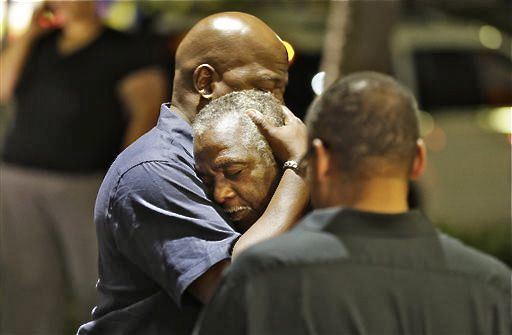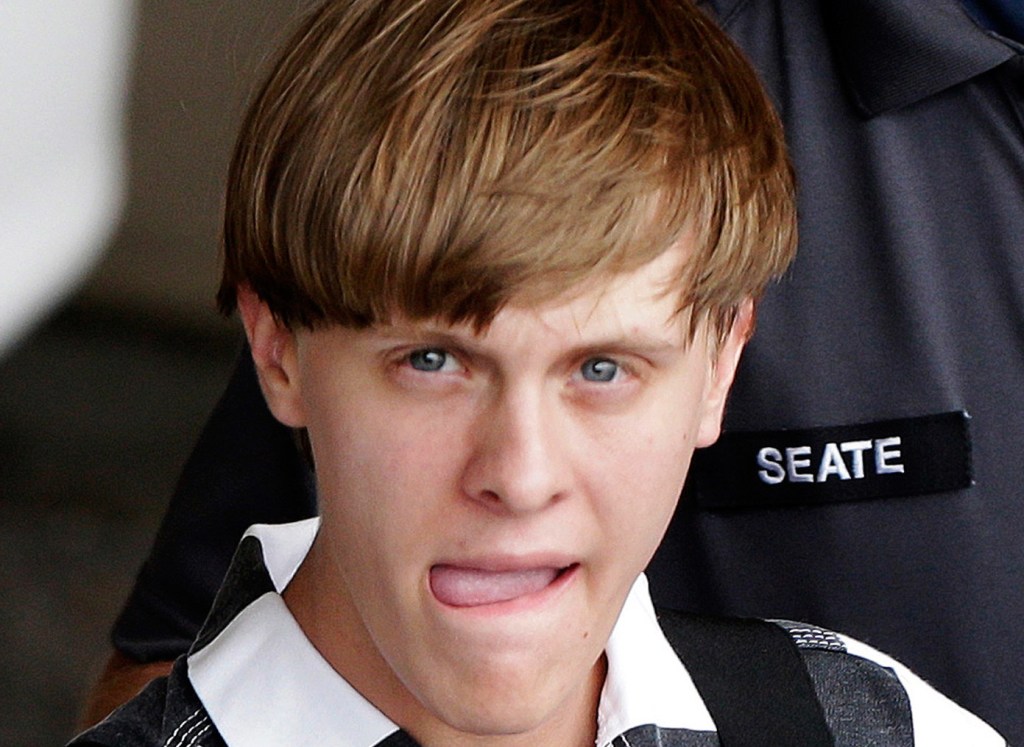CHARLESTON, S.C. — A white man who joined a prayer meeting inside a historic black church and then fatally shot nine people was captured without resistance Thursday after an all-night manhunt, Charleston’s police chief said.
Dylann Storm Roof, 21, spent nearly an hour inside the church Wednesday night before killing six women and three men, including the pastor, Chief Greg Mullen said. A citizen spotted his car in Shelby, North Carolina, nearly four hours away.
The chief wouldn’t discuss a motive. Charleston Mayor Joseph P. Riley Jr. called it “pure, pure concentrated evil.” Stunned community leaders and politicians condemned the attack on The Emanuel African Methodist Episcopal Church, and Attorney General Loretta Lynch said the Justice Department has begun a hate crime investigation.
Chris Morin, 47, an Augusta, Maine, native and Cony High School graduate, has lived in Mount Pleasant, South Carolina, about five miles from where the shooting occurred in Charleston, for about four years, and lived in the area before then as well.
He said he and others in the community felt great relief Thursday when police announced they had arrested a suspect.
“People were nervous (before the suspect was arrested), because you don’t know what is happening out there,” said Morin, who lives with his wife, Gretchen, and their 17-year-old daughter, Reilly. “You wonder, walking around, what’s behind you. … Could it happen somewhere else?”
Morin, who works for a contractor and is a real estate agent, attends a church other than the one where the shooting took place, but he said he is familiar with it, as he drives by it regularly and did a project about a block away.
He said the normally bustling downtown area near the church was quiet Thursday. Streets were blocked off. Prayer services were taking place at churches near the site of the tragedy.
“It was pretty surreal this morning, when I woke up and heard about it. I thought it was a dream or nightmare. I couldn’t believe something like that happened,” Morin said.
He said people in the area are religious and are taking the tragedy hard.
“It’s a very tight community. Almost everybody belongs to a church. It really struck the area hard,” he said. “It’s close. Just a tragedy. No idea what the motive was or why anybody would do something like this.”
President Barack Obama, who personally knew the slain pastor, state Sen. Clementa Pinckney, said these shootings have to stop.
“At some point, we as a country will have to reckon with the fact that this type of mass violence does not happen in other advanced countries,” Obama said.
Pinckney, 41, was a married father of two who spent 19 years in the South Carolina legislature. He became the youngest member of the House when he was first elected as a Democrat at 23.
“He had a core not many of us have,” said Sen. Vincent Sheheen, who sat beside Pinckney in the Senate. “I think of the irony that the most gentle of the 46 of us — the best of the 46 of us in this chamber — is the one who lost his life.”
The other victims were identified as Cynthia Hurd, 54; Tywanza Sanders, 26; the Rev. Sharonda Singleton, 45; Myra Thompson, 59; Ethel Lance, 70; Susie Jackson, 87; the Rev. Daniel Simmons Sr., 74; and DePayne Doctor, 49.
The shootings took out the heart of a community — civic leaders including three pastors, a regional library manager, a college enrollment counselor, and a high school track coach — and left the historic church with just one living minister.
“Immediately, my heart started to sink, because I knew that this was going to mean a forever impact on many, many people,” Charleston County Coroner Rae Wooten said, adding autopsies would be conducted over the next several days. He did not have specific information on how many times the victims were shot or the locations of their injuries.
Roof waived extradition from North Carolina Thursday and was taken to a waiting police car wearing a bulletproof vest, with shackles on his feet and his hands cuffed behind his back. Roof waived his right to counsel, meaning he will either represent himself or hire his own lawyer.
Roof’s childhood friend, Joseph Meek Jr., alerted the FBI after recognizing him in a surveillance camera image. They recognized the stained sweatshirt he had been wearing while playing Xbox video games in their home.
“I don’t know what was going through his head,” said Meek’s mother, Kimberly Konzny. “He was a really sweet kid. He was quiet. He only had a few friends.”
But Roof had been to jail: court records show a pending felony drug case and a past misdemeanor trespassing charge. And he proudly displayed the flags of defeated white-ruled regimes, posing with a Confederate flag plate on his car and wearing a jacket with stitched-on flag patches from Rhodesia, which is now black-led Zimbabwe, and apartheid-era South Africa.
Meek said they had been best friends in middle school, then lost touch for years until Roof reappeared a few weeks ago.
“All the sudden out of the blue, he started talking about race. He started talking about Trayvon Martin,” Meek said after he was questioned by authorities.
“He said blacks were taking over the world. Someone needed to do something about it for the white race. He said he wanted segregation between whites and blacks. I said, ‘That’s not the way it should be.’ But he kept talking about it.”
Roof wasn’t known to the Southern Poverty Law Center in Montgomery, Alabama, and it’s not clear whether he had any connection to the 16 white supremacist organizations operating in South Carolina, but he appears to be a “disaffected white supremacist,” based on his Facebook page, said the center’s president, Richard Cohen.
Charleston authorities put out photos of the suspect from the church’s surveillance camera early Thursday. Later that morning, authorities west of Charlotte, North Carolina, got a report of a sighting of the suspect’s car headed west, said Jeff Ledford, the police chief in Shelby, North Carolina. Officers pulled over the driver and arrested Roof just before 11 a.m., about 14 hours after the attack.
A gun was found in the car, Mullen said.
The shooting evoked painful memories of other attacks. Black churches were bombed in the 1960s when they served as organizing hubs for the Civil Rights movement, and burned by arsons across the South in the 1990s. Others survived shooting sprees.
This particular congregation, which formed in 1816, has its own grim history: A founder, Denmark Vesey, was hanged after trying to organize a slave revolt in 1822, and white landowners burned the church in revenge, leaving parishioners to worship underground until after the Civil War.
This shooting “should be a warning to us all that we do have a problem in our society,” said state Rep. Wendell Gilliard, a Democrat whose district includes the church. “There’s a race problem in our country. There’s a gun problem in our country. We need to act on them quickly.”
“Of all cities, in Charleston, to have a horrible hateful person go into the church and kill people there to pray and worship with each other is something that is beyond any comprehension and is not explained,” Riley said. “We are going to put our arms around that church and that church family.”
NAACP President and CEO Cornell William Brooks said “there is no greater coward than a criminal who enters a house of God and slaughters innocent people.”
A few bouquets of flowers tied to a police barricade outside the church formed a small but growing memorial.
“Today I feel like it’s 9-11 again,” Bob Dyer, who works in the area, said after leaving an arrangement of yellow flowers wrapped in plastic. “I’m in shock.”
The attack came two months after the fatal shooting of an unarmed black man, Walter Scott, by a white police officer in neighboring North Charleston, which increased racial tensions. The officer awaits trial for murder, and the shooting prompted South Carolina to pass a law, co-sponsored by Pinckney, to equip police statewide with body cameras.
Send questions/comments to the editors.




Success. Please wait for the page to reload. If the page does not reload within 5 seconds, please refresh the page.
Enter your email and password to access comments.
Hi, to comment on stories you must . This profile is in addition to your subscription and website login.
Already have a commenting profile? .
Invalid username/password.
Please check your email to confirm and complete your registration.
Only subscribers are eligible to post comments. Please subscribe or login first for digital access. Here’s why.
Use the form below to reset your password. When you've submitted your account email, we will send an email with a reset code.